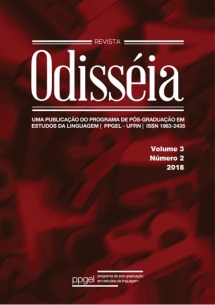Ulisses no carro do sol
DOI:
https://doi.org/10.21680/1983-2435.2018v3n2ID15282Palavras-chave:
Épica, Memória, Sentido, Olhar, ViagemResumo
Neste artigo, a epopeia homérica será a fonte escolhida para demonstrar um conjunto de saberes estabelecido anteriormente aos naturalistas jônicos. Em nossa hipótese de leitura, a épica de Homero já apresenta um inicial posicionamento naturalista, a começar pelo fato de suas obras constituírem, a partir da experiência de morte, um elogio à própria vida. E para demonstrar esse jogo de antíteses entre as duas experiências, veremos que, na épica homérica, a presença do relato de viagem tem o propósito de registrar o real exclusivamente apreendido pelos sentidos humanos, mesmo nas cenas mais subjetivas que envolvem lugares infernais e seres lendários. Não afirmaremos tal característica a ponto de transformarmos Homero num empírico, mas trata-se de uma primeira alternativa frente o passado maravilhoso evocado pelos aedos da tradição.
Downloads
Downloads
Publicado
Como Citar
Edição
Seção
Licença

Este trabalho foi licenciado com uma Licença http://creativecommons.org/licenses/by-nc-sa/4.0

















